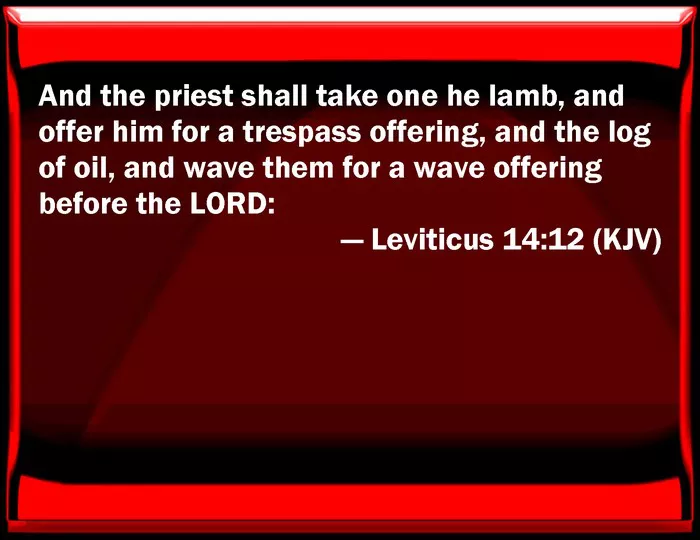Read the Daily Bible Verse – Leviticus 14:12 To Strengthen Your Spiritual Journey.
The Bible is a source of deep wisdom and guidance, and Leviticus is one of its books that contains laws and instructions for worship, cleanliness, and community living. In this article, we will explore Leviticus 14:12 (KJV) to understand its context, meaning, and application in life.
The Context of Leviticus 14:12 KJV
Leviticus 14 is part of the instructions God gave to Moses for the Israelites. This chapter specifically deals with the purification process for someone healed of leprosy. Leprosy, as described in the Bible, refers to various skin conditions that made individuals ceremonially unclean and isolated them from the community.
This purification ritual required specific offerings and actions, emphasizing God’s holiness and the importance of being pure to approach Him. The instructions in Leviticus 14 demonstrate God’s care for both physical health and spiritual restoration.
Leviticus 14:12 (KJV)
Here is the verse in the King James Version:
“And the priest shall take one he lamb, and offer him for a trespass offering, and the log of oil, and wave them for a wave offering before the Lord.”
Breaking Down the Verse
“And the priest shall take one he lamb”
The he lamb was a vital part of the ritual, symbolizing innocence and the removal of guilt. Lambs were often used in offerings because of their association with purity and obedience.
“And offer him for a trespass offering”
The trespass offering, or guilt offering, was meant to atone for sins that required restitution. It recognized the individual’s wrongs and sought reconciliation with God.
“And the log of oil”
The oil represented cleansing, healing, and the presence of the Holy Spirit. It was used in the ceremony to signify restoration.
“And wave them for a wave offering before the Lord”
A wave offering involved presenting the items before God, acknowledging His sovereignty and expressing gratitude. It symbolized giving back to God what belongs to Him.
Leviticus 14:12 Meaning
Holiness and Atonement
Leviticus 14:12 highlights the importance of atonement in restoring a person to both God and the community. The trespass offering acknowledges the person’s past offenses, while the ceremonial actions reflect God’s provision for cleansing and reconciliation.
The Role of the Priest
The priest acted as a mediator between the person and God. This foreshadows the role of Jesus Christ, who serves as our High Priest and mediator, offering His sacrifice for our sins.
Symbolism of the Lamb and Oil
The lamb is a precursor to Jesus Christ, referred to as the “Lamb of God” in the New Testament (John 1:29). The oil signifies spiritual renewal, a theme echoed in the work of the Holy Spirit in believers’ lives.
Restoration to the Community
The purification ritual allowed individuals to rejoin the community. This demonstrates God’s desire for relationships to be restored, both with Him and among His people.
Leviticus 14:12 Application in Life
Recognizing Our Need for Cleansing
Leviticus 14:12 reminds us that we all need spiritual cleansing. Sin separates us from God, but through Jesus Christ, we can find forgiveness and restoration.
Embracing God’s Provision
The trespass offering and wave offering emphasize that God provides a way for reconciliation. Today, we no longer need to bring a lamb to the altar because Jesus fulfilled this requirement through His sacrifice on the cross.
Living a Life of Gratitude
The wave offering teaches us to acknowledge God’s blessings and sovereignty in our lives. We can show gratitude by living in obedience and offering ourselves as “living sacrifices” (Romans 12:1).
The Role of Community
The ritual for cleansing leprosy underscores the importance of being part of a community. As Christians, we are called to support one another, encouraging each other in faith and love (Hebrews 10:24-25).
Conclusion
Leviticus 14:12 may seem like an ancient ritual far removed from modern life, but its principles are timeless. It speaks of God’s holiness, our need for cleansing, and the path to restoration. Through Jesus Christ, we have access to the ultimate sacrifice that atones for our sins, reconciling us to God and enabling us to live in community with others.
As we reflect on this verse, let us remember the depth of God’s love and the provision He made for us. By understanding the meaning of Leviticus 14:12, we can grow in appreciation for the spiritual truths that guide us in living a life that honors Him.
Related topics:
- What Does Leviticus 14:11 Mean?
- Leviticus 14:10 Meaning, Context & Commentary
- What Does Leviticus 14:9 Mean?

